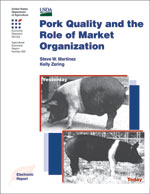Pork Quality and the Role of Market Organization
- by Stephen Martinez and Kelly Zering
- 11/8/2004
Overview
This study addresses changes in the organization of the U.S. pork industry, most notably marketing contracts between packers and producers, by exploring their function in addressing pork quality concerns. A number of developments brought quality concerns to the forefront. These include health concerns and corresponding preferences for lean pork, growing incidence of undesirable quality attributes (e.g., pale, soft, and exudative (PSE) meat, a result of breeding for leanness), heightened concerns over food safety and related regulatory programs, and expansion into global markets. Organizational arrangements can facilitate industry efforts to address pork quality needs by reducing measuring costs, controlling quality attributes that are difficult to measure, facilitating adaptations to changing quality standards, and reducing transaction costs associated with relationship-specific investments in branding programs.
Download
-
Entire report
Download PDF -
Research Brief
Download PDF -
Abstract, Acknowledgments, Contents, and Summary
Download PDF -
Introduction
Download PDF -
Product Quality and Market Organization: Two Theoretical Perspectives
Download PDF -
Changing Emphasis on Pork Quality
Download PDF -
Role of Contracts in Reducing Measuring Costs Associated With Carcass Pricing Grids
Download PDF -
Marketing Contract Design to Reduce Transaction Costs and Control Quality Attributes
Download PDF -
Organization of Packer Branding Programs That Use Specific Genetics
Download PDF -
Conclusions
Download PDF -
References
Download PDF -
Appendix A: Inventory of Long-Term Contracts: General Contract Provisions
Download PDF -
Appendix B: Contract Clauses Related to Input Requirements and Monitoring
Download PDF -
Appendix C: An Example of Reduced Incentives For Leaner Hogs
Download PDF -
Appendix D: Packer Branding Programs That Rely on a Specific Type of Genetics
Download PDF

